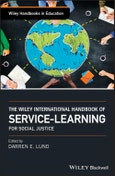A comprehensive guide to service-learning for social justice written by an international panel of experts
The Wiley International Handbook of Service-Learning for Social Justice offers a review of recent trends in social justice that have been, until recently, marginalized in the field of service-learning. The authors offer a guide for establishing and nurturing social justice in a variety of service-learning programs, and show that incorporating the principles of social justice in service-learning can empower communities to resist and disrupt oppressive power structures, and work for solidarity with host and partner communities.
With contributions from an international panel of experts, the Handbook contains a critique of the field’s roots in charity; a review of the problematization of Whitenormativity, paired with the bolstering of diverse voices and perspectives; and information on the embrace of emotional elements including tension, ambiguity, and discomfort.
This important resource:
- Considers the role of the community in service-learning and other community‑engaged models of education and practice
- Explores the necessity of disruption and dissonance in service-learning
- Discusses a number of targeted issues that often arise in service-learning contexts
- Offers a practical guide to establishing and nurturing social justice at the heart of an international service-learning program
Written for advanced undergraduate students, graduate students, scholars, and educators, The Wiley International Handbook of Service-Learning for Social Justice highlights social justice as a conflict‑ridden struggle against inequality, xenophobia, and oppression, and offers practical suggestions for incorporating service-learning programs in various arenas.
Table of Contents
Notes on Contributors ix
Part I Introduction 1
The Social Justice Turn in Service‐Learning: Cultivating “Critical Hope” and Engaging with Despair 3
Kari M. Grain, Assistant Editor, and Darren E. Lund, Editor
Part II Introduction to Service‐Learning for Social Justice 27
1 Service‐Learning and the Discourse of Social Justice 29
Alison Taylor, Stephanie Glick, and Nasim Peikazadi
2 “We Built up our Knowledge Together and Because it was Shared”: Asian American Studies and Recasting the Civic in Civic Engagement 53
Kathleen S. Yep
3 Spanish Heritage Speakers, Service‐Learning, and Social Justice 75
Rafael Gómez
Part III Challenging Hegemony through Service‐Learning 97
4 Critical Feminist Service‐Learning: Developing Critical Consciousness 99
Jennifer Hauver and Susan V. Iverson
5 Service‐Learning in Higher Education by, for, and about LGBTQ People: Heterosexism and Curriculum Shadows 123
David M. Donahue
6 Local‐to‐Global Indigenous Health in Service‐Learning: Collaboration with Child, Family, and Community 145
Elder “Grandmother” Doreen Spence, Kupuna “Aunty” Francine Dudoit Tagupa, Andrea Puamakamae`okawēkiu Kennedy, Lisa Semple, Samantha Cardinal, Rachael Jones, and Michelle Scott
7 Transforming Preservice Teacher Practices and Beliefs through First Nations, Métis, and Inuit Critical Service‐Learning Experiences 171
Yvonne Poitras Pratt and Patricia J. Danyluk
8 Critical Disability Studies and Community Engagement 191
Kathleen C. Sitter and Emily A. Nusbaum
Part IV Disruption and Dissonance through Service‐Learning 203
9 Postcritical Service‐Learning: Interruptions to Ethnocentric and Salvationist Discourses 205
Judy Bruce
10 Reshaping Professional Programs through Service‐Learning: Moving Beyond Traditional Clinical Experiences to Challenge Power and Privilege 225
Alan Tinkler and Barri Tinkler
11 Fostering Cultural Humility among Preservice Teachers: Connecting with Children and Youth of Immigrant Families through Service‐Learning 239
Darren E. Lund and Lianne Lee
12 “Moving” Experiences: Service‐Learning from Border Crossing to Trespassing 263
Patricia A. Whang
Part V Defining and Engaging Community in Service‐Learning 279
13 Social Justice and Community‐Engaged Scholarship: Reconceptualizing Community, Engagement, and Service 281
Tania Kajner
14 Community as Teacher: Who’s Learning? Who’s Teaching? 299
Shauna Butterwick
Part VI International Engagement through Service‐Learning 319
15 International Service‐Learning: Guiding Theories and Practices for Social Justice 321
Robbin D. Crabtree and David Alan Sapp
16 Global Service‐Learning: Enhancing Humility 353
Victoria Calvert, David Peacock, Margot Underwood, Judy Gleeson, Andrea Puamakamae`okawēkiu Kennedy, and Scharie Tavcer
17 Ethical Global Partnerships: Leadership from the Global South 375
Ramaswami Balasubramaniam, Eric Hartman, Janice McMillan,and Cody Morris Paris
Part VII The Pedagogy and Practice of Service‐Learning 393
18 A Practical Guide to Developing and Maintaining Social Justice at the Heart of ISL 395
Tamara Baldwin, Kari M. Grain, and Dawn Currie
19 Participatory Assessment: Enlisting Community Partners to Facilitate Boundary Spanning, Reflexive Student Activism, and Institutional Change 415
Sandra E. Godwin and Cynthia Ward‐Edwards
20 Service‐Learning as Power Analysis in the Humanities 437
Claire J. King
21 Service‐Learning and STEM Creating New Possibilities in Public Schools 457
Jaime E. Martinez and Amy Bravo
Index 477








